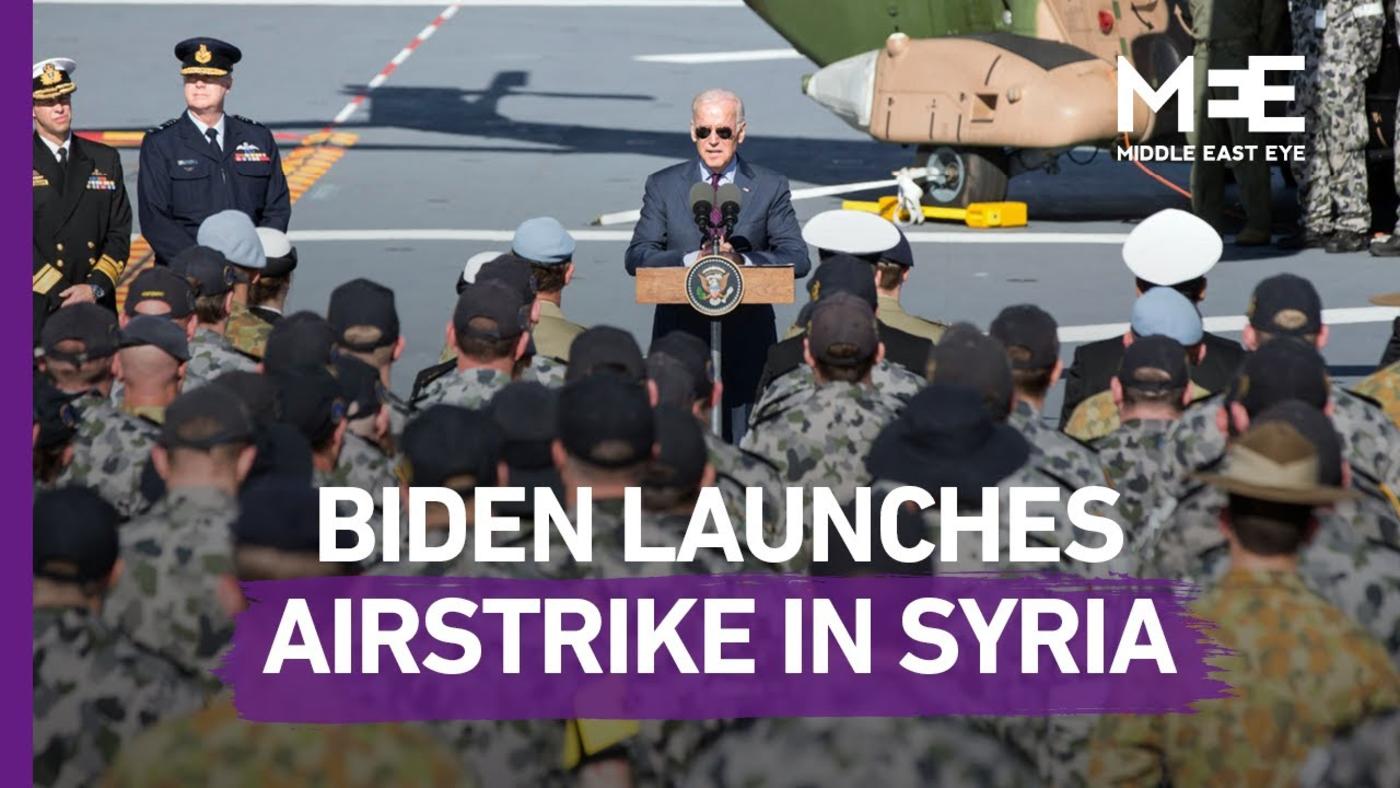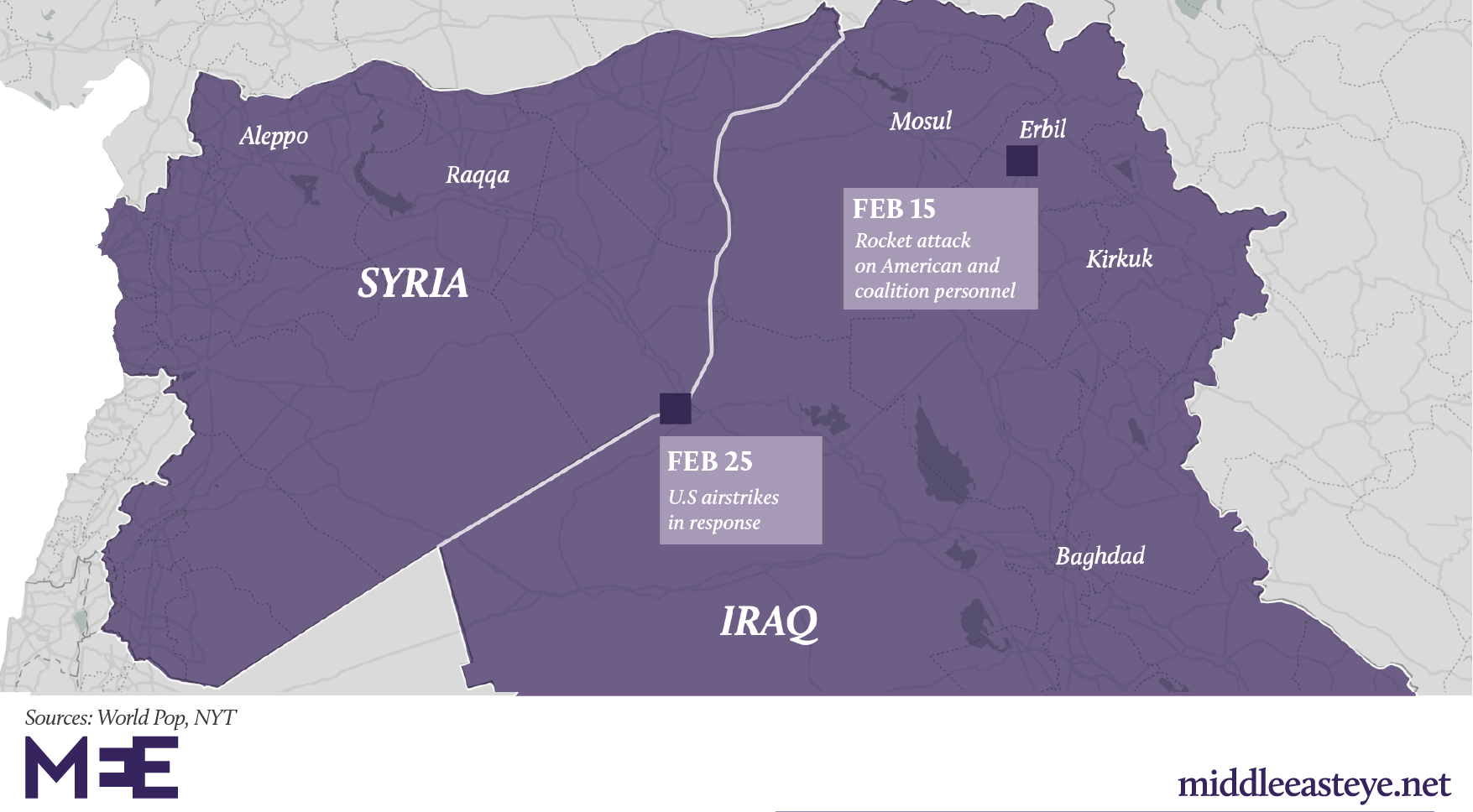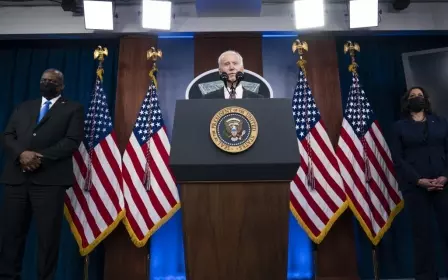US lawmakers question legality of Biden's air strikes in Syria
US lawmakers have asked the administration of President Joe Biden to provide legal justification for its decision to launch air strikes on military targets in Syria, amid growing complaints of overreaching presidential war powers enacted after the attacks of September 11, 2001.
The Pentagon on Friday said the US was responding to attacks by Iran-backed militias earlier this month in which one US military contractor was killed and nine other people were wounded.
According to multiple reports, at least one fighter was killed and three others wounded in Thursday's strike - close to the border region with Iraq, where Kataeb Hezbollah and several other Shia armed factions are said to be headquartered.
Other reports suggested the death toll may be as high as 22.
Pentagon spokesperson John Kirby described the raid as a "proportionate military response".
Biden, in speaking to reporters on Friday about what message he was sending to Iran with the air strikes, said: "You can't act with impunity. Be careful."
But US lawmakers, including representatives Ilhan Omar, Ro Khanna and former presidential candidate Senator Bernie Sanders, said not only did the strikes not follow procedural diligence, they raised the spectre of presidential overreach.
'The American people deserve to hear the administration's rationale for these strikes and its legal justification for acting without coming to Congress'
- Senator Tim Kaine
"Military action - in a country where Congress has not authorised war - is unconstitutional in almost all circumstances," Omar said in a statement.
"The administration must provide a legal rationale for why these strikes met the high bar for military action without Congressional approval. They must also provide transparency around any civilian casualties that resulted from the strike as soon as possible.
"These are the same questions we must ask regardless of the administration. Our Congressional oversight duty does not change depending on who is in the White House," Omar added.
Addressing the media, White House press secretary Jen Psaki said President Joe Biden was "sending an unambiguous message that he's going to act to protect Americans, and when threats are posed, he has the right to take an action at the time, and in the manner of his choosing".
"He also is going to take those actions in a manner that's deliberative, and that has the objective of de-escalating activity in both Syria and Iraq," said Psaki, who has been the subject of criticism for raising the question of legality in 2017 when then-president Trump conducted air strikes in Syria without Congressional approval.
Reacting to the developments, Senator Sanders said that, for far too long, US presidents had exercised military overreach under the guise of keeping "Americans safe".
"The president has the responsibility to keep Americans safe, but for too long administrations of both parties have interpreted their authorities in an extremely expansive way to continue war. This must end," Sanders said in a statement.
Representative Ro Khanna, who has repeatedly called for an end to the war in Yemen and sponsored legislation to halt Trump's stated ambitions to take military action against Iran, said there was "absolutely no justification" for the Syria strike.
"This makes President Biden the seventh consecutive US president to order strikes in the Middle East," Khanna added.
"We need to extricate from the Middle East, not escalate," he said.
The sidelining of Congress ahead of military strikes or entering war is not a unique event in US politics, especially since former president George W Bush signed the Authorization for Use of Military Force (AUMF) into law a week after the 2001 attacks on the World Trade Center and Pentagon.
The AUMF gives the president expansive powers to make wide-reaching interpretations in the event of a threat to national security.
Mary Ellen O'Connell, a professor at Notre Dame and co-author of Self-Defense Against Non-State Actors, told Vox that, despite the liberal readings of AUMF, Biden should have reached out to Congress to seek approval because the said attacks were no longer imminent nor active.
O'Connell added that the US also had time to work with the UN Security Council rather than order strikes.
Nader Hashemi, assistant professor of Middle East and Islamic politics at the University of Denver, told Middle East Eye that Biden's actions raised the question as to what US policy towards the war-torn country was likely to be.
"It is completely unclear," Hashemi said. "Moreover, what is the goal and strategy of these air strikes? The official position is that it is meant to deter Iran from using its proxies to hit American targets inside Iraq.
"If this is the aim then it seems Biden has an Iran policy for Syria over Tehran's behaviour in Iraq."
Two Senate war powers critics, Democrats Tim Kaine and Chris Murphy, also spoke out on Friday over why Biden ordered the attack without first consulting them.
"The American people deserve to hear the administration's rationale for these strikes and its legal justification for acting without coming to Congress," said Kaine, who sits on the Armed Services and Foreign Relations Committees.
"Offensive military action without congressional approval is not constitutional absent extraordinary circumstances," he added. "Congress must be fully briefed on this matter expeditiously."
Murphy, a Foreign Relations Committee member, said in a statement that "retaliatory strikes, not necessary to prevent an imminent threat, must fall within the definition of an existing congressional authorisation of military force".
Asked to comment on the US air strikes, a spokesperson for UN Secretary-General Antonio Guterres said the UNSG was closely following the reports.
"He remains concerned about the volatile situation in the region and calls on all concerned sides to exercise restraint and avoid escalation," the spokesperson said.
The UN did not immediately respond to Middle East Eye's request for comment on the legality of the air strikes.
Middle East Eye propose une couverture et une analyse indépendantes et incomparables du Moyen-Orient, de l’Afrique du Nord et d’autres régions du monde. Pour en savoir plus sur la reprise de ce contenu et les frais qui s’appliquent, veuillez remplir ce formulaire [en anglais]. Pour en savoir plus sur MEE, cliquez ici [en anglais].







